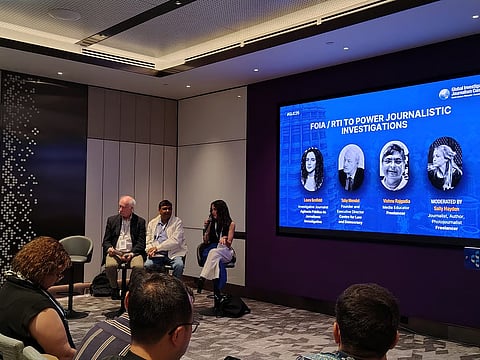
Kuala Lumpur – The Global Investigative Journalism Conference (GIJC25), a landmark event for investigative reporters worldwide, wrapped up successfully from November 20 to 24, 2025. Held for the first time in Asia, the five-day gathering drew over 1,500 journalists from 135 countries, including around 20 from India.
The conference featured more than 150 panel discussions, workshops, training sessions, and networking meetings, where attendees shared reporting techniques, experiences, and challenges. Speakers from over 100 nations delved into diverse styles, methods, and innovations in investigative journalism, with a record 100+ Asian journalists participating as speakers, highlighting the continent's rising influence in global watchdog reporting.
India's digital platform The Mooknayak emerged as a standout, earning widespread appreciation for its public-interest initiatives rooted in citizen investigative journalism. In a dedicated session on the Right to Information (RTI) Act, senior journalist Dr. Vishnu Rajgahria highlighted the pivotal role of investigative journalism in India.
He specifically praised The Mooknayak's use of RTI-based reporting and citizen-led investigations. Rajgahria noted that the Global Investigative Journalism Network (GIJN) had trained The Mooknayak team, along with other journalists, in RTI techniques during a 2024 Delhi workshop. Building on this, the platform mobilized ordinary citizens to file numerous RTI applications, uncovering critical insights into the dire state of medical education in India. This effort was lauded at GIJC25 as a robust model of "crowd reporting," demonstrating how collaborative, grassroots approaches can drive impactful exposés.
A session on partnership-based investigative journalism among South Asian reporters featured GIJN's Hindi Editor Deepak Tiwari, who elaborated on the growing significance of collaborative journalism. He emphasized how cross-border and inter-media partnerships amplify stories that might otherwise remain untold, fostering stronger networks for accountability journalism.
Several Indian journalists made notable contributions. In a session on democracy and investigative journalism, independent reporter Poonam Agarwal shared her insights. Mayank Agarwal served as a speaker in a discussion on the state of investigative reporting in Asia. The conference opened with a sobering focus on the escalating attacks and pressures faced by journalists worldwide, with venue banners proclaiming "Journalism is Not a Crime" underscoring the urgent need to protect press freedom.
The conference commenced with profound expressions of concern over the escalating attacks and pressures on journalists worldwide. Organizers clearly stated that in many countries, journalists' safety is increasingly at risk, with rising assaults, threats, and legal pressures, grave indicators for democracy. Large banners proclaiming “Journalism is Not a Crime” were displayed throughout the venue, symbolizing the urgent need to protect and strengthen investigative journalism as today's greatest priority. These messages intensified the conference's somber atmosphere, inspiring journalists from around the world to unite in safeguarding freedom of expression.
A closer look at the conference's highlights reveals that GIJC25 was truly a vast and influential platform for global journalism. Over the five-day event, more than 150 panel discussions, workshops, training sessions, and networking meetings were organized, where journalists shared their reporting techniques, experiences, and challenges. Representatives from over 100 countries participated as speakers, engaging in discussions on diverse styles, methods, and innovations in investigative journalism. Notably, a record over 100 journalists from Asia served as speakers, underscoring the rapid advancement of investigative reporting in Asian nations and their growing role in the global discourse.
As the 14th edition since its inception in 2001, GIJC25 truly embodied a massive, influential platform for international journalism. The event's Asian debut was a point of pride and inspiration for the continent's media community, showcasing how regional voices are shaping worldwide narratives on transparency and accountability.
The global recognition of The Mooknayak's work is more than an accolade—it's a milestone for journalism centered on marginalized voices. The praise for its RTI-powered reporting, citizen collaborations, and probes into sensitive issues like medical education has invigorated the team. Operating with limited resources amid challenging conditions, the platform proves that people-centric journalism not only survives but thrives on the world stage.
This validation reinforces The Mooknayak's conviction that leveraging tools like RTI with public involvement can powerfully spotlight societal issues. It's a beacon for readers, supporters, and young media enthusiasts dedicated to building a more empowered and accountable press. This international nod propels The Mooknayak toward even bolder, research-driven, and community-focused storytelling in the future.
You can also join our WhatsApp group to get premium and selected news of The Mooknayak on WhatsApp. Click here to join the WhatsApp group.